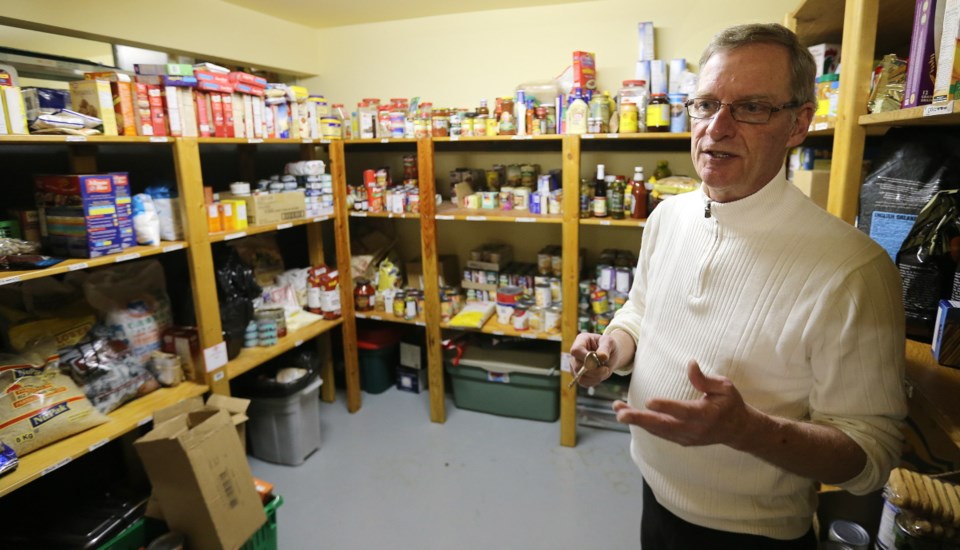Before lunch is served at Anawim House, a sign-up sheet to help with meal preparation and clean up must be filled.
Guests sit at a long, heavy wood table handmade in the shop outside by the guests and residents who came before them.
The recovery house and drop-in centre on the corner of Caledonia and Vancouver streets is run by those who once needed its refuge — and some who still do.
It might not be the most high-profile shelter in the city, but it is one of the longest-standing and serves a unique purpose.
“It really is what it was meant to be,” said house director Terry Edison-Brown. “The concept for Anawim came from people on the streets.”
In the late 1980s, a group that ran the 9/10 Club soup kitchen in the basement of St. Andrew’s Catholic Cathedral asked their daily patrons what would help them get back on their feet.
“They said, ‘Give us a place to provide for ourselves. People are always serving us,’ ” Edison-Brown said.
Through networking among the faith and larger communities, money was raised to buy the property and original Anawim House. (Anawim means “God’s precious poor” in Hebrew.) A few years later, thousands more were raised and a 6,000-square-foot building was built. The space would allow for a residential program as well as a drop-in centre.
“We’re here for people who want to make a change in their life. It can be from anything — addiction, poverty, mental-health issues,” said Edison-Brown, 43. He came to Anawim in his early 20s after struggling with alcoholism and drug addiction.
Anawim House operates two main programs: A low-rent residency for men, who stay at least a year and help out with chores and work shifts, and a co-ed drop-in centre that provides free meals, showers, laundry, clothing and activities. The programs are for adults only and the environment is clean and sober.
With four staff and an annual budget of about $220,000, the programs serve about 35 people a day and house seven men. The majority of funding comes from community donors. The group also has about 25 volunteers and is seeking more, particularly to greet visitors and run art, woodworking and computer classes.
“We manage to do a lot with what we have,” said Edison-Brown, noting the house is now in need of major repairs.
When Daniel Wallace came to Anawim House more than four years ago, he was a recovering alcoholic who had lost his home and was living in his car and local shelters.
“I remember walking into a washroom stall [at a downtown shelter] and seeing a bucket for used needles, thinking, ‘A year ago, I owned a house in Oak Bay and only complained about my daughters’ shampoo bottles in the bathroom,’ ” said Wallace, who worked in the home furnishings business.
The father of four managed to get sober and stable at Anawim House, only to suffer a brain injury when he was hit by a car two years later. He decided to stay at Anawim House while he recovered, joined the Brain Injury Society and found himself taking on a new role to help others.
“I’ve totally changed my mind about how I want to spend my life. The people I’ve met here did that,” said Wallace, who started out helping others learn to use email and the Internet. He then became the newsletter editor for Anawim and the Brain Injury Society. He just started a new role as a communications liaison for Anawim.
Tom Opie moved to Anawim House in November to recover from multiple surgeries related to a necrotizing pancreatitis that nearly killed him six months earlier. “I was completely out for a month and a half. … They gave me a 30 per cent chance of survival,” said the 38-year-old
The chef battled alcoholism off and on in recent years. He said he was on a “bad bender” when he ended up at Cool Aid Society’s Rock Bay shelter and noticed his stomach was distended.
“I thought I was in pretty good health. I had no idea this could happen,” Opie said.
He said the health scare was a wake-up call and a second chance.
“I believe I survived for a reason. I will never go back to drinking. I know I’ll die,” said Opie, who could barely walk a few months ago and has a fresh surgery scar covering half his belly. Despite this, he radiates positivity, humour and gratitude at having a place to heal.
“Coming here has given me a chance to help others, too, even in small ways. It helps take away my pain,” said Opie, who enjoys cooking elaborate meals for the house.
He said he’ll never return to the chef lifestyle — it would be too easy to fall back into drinking. Instead, he hopes to go back to college after his recovery. “I would like to have a family some day. I think I still look pretty good for a guy my age who’s been pretty hard on himself,” Opie said, smiling.



